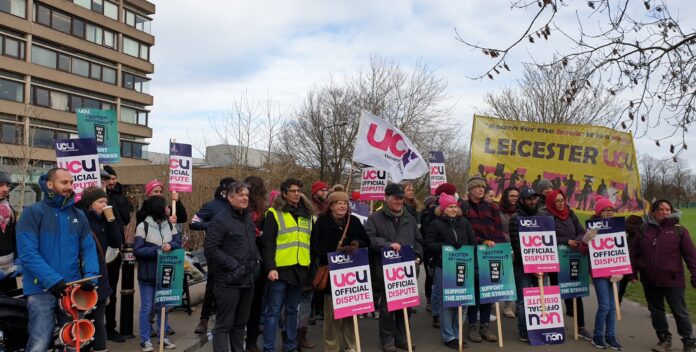Bea Gardner, UCU member
On 1 February, University and Colleges Union (UCU) members will take an important step in our escalating programme of action – taking the first of what will be 18 days of strike action across February and March.
University workers are determined to see this action through, having taken three days of nationwide strike action this academic year, on top of extensive action on a disaggregated basis since the autumn of 2019 in our pay dispute, and since 2018 in the USS pension dispute.
2022 marked the first time UCU members met the Tories’ anti-democratic 50% turnout threshold nationwide, bringing action at 150 institutions. We are drawing a line to say we refuse to accept another year of our terms and conditions being driven down, through rocketing workloads, real-term pay cuts, the proliferation of casual contracts and attacks to our pensions.
Staff pay has fallen in real terms by 25%, but vice-chancellors’ pay has soared: they now earn an average of £315,000 a year! Universities sit on combined reserves of over £40 billion, while 90,000 academic and professional service staff struggle on insecure contracts.
USS cuts made last year will see the average member lose 35% from their guaranteed future retirement income, despite the scheme being in surplus.
University bosses can afford to implement a real-terms pay rise and use reserves to restore our pensions.
The protracted nature of the disputes, spanning years, shows the need for escalation. If the members’ demands are not met, the calendar of escalating action includes a marking and assessment boycott scheduled for the summer term, and further strike action into the next academic year.
Prepare
The union’s leadership must prepare for this, including by strengthening the strike fund. Members also need to have confidence that the union’s leadership will stay the course, rather than publicly cast doubt on the democratically agreed strategy for the dispute, as general secretary Jo Grady has done recently.
A strong and effective ‘broad left’ in the union is also needed to bring activists together to discuss and fight for a militant programme. This includes a political programme: against marketisation, for free education, and for the funding needed to run higher education as a public good.
That the 1 February strike day coincides with other trade unions is significant. Piling further pressure on the Tory government will strengthen the confidence of workers in the universities and elsewhere. Additional days of coordinated strike action could be powerful enough to hasten the end of the Tory government. Budget day, 15 March, is an opportunity for all of us to strike together.
UCU has named its 18 days of action, which include 16 and 17 March but unfortunately not 15 March. We call on the leadership to modify the plan, so that the UCU can go out with the NEU and potentially other unions on Budget Day.
Under the leadership of Jeremy Corbyn, Labour’s 2017 general election manifesto put forward free higher education. But now, Labour’s new leader Sir Keir Starmer has refused to pledge its inclusion in a future manifesto. He has made it clear that he does not support workers getting a pay rise to keep up with the cost of living.
In the event of a general election, university workers need candidates prepared to fight in our corner for pay rises and in defence of our terms and conditions, and that fight for free, fully funded higher education. That means preparing now to put up a workers’ alternative to Labour at the ballot box, including UCU members as candidates alongside other trade unionists and working-class fighters.







